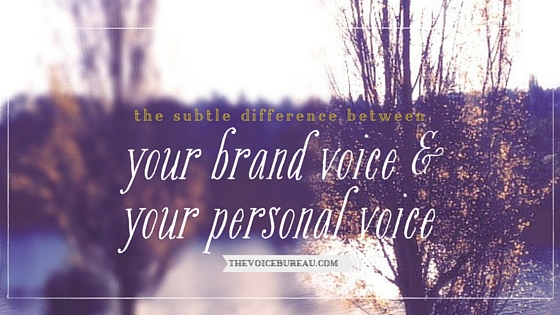About this column
Your Right Person is listening. Learning to use your Voice Values ensures you’re speaking the same language. Create. Connect. Converse. (Convert.)
 You don’t want there to be a difference between your brand voice & your personal voice, but there is.
You don’t want there to be a difference between your brand voice & your personal voice, but there is.
The idea of a difference feels artificial, inauthentic, and potentially dangerous. What if the voice of my brand FEELS different to my Right Person than my own voice does, & when they work with me or meet me in person, they feel the disconnect?
But there is a difference — albeit sometimes a subtle one — between brand voice & personal voice, & the difference exists for a reason.
Here at The Voice Bureau, we believe passionately in the separation of brand voice and personal voice. We find it empowering — and we teach our clients and customers how to embrace and appreciate the difference.
The differences that matter to you, as a brand creator or business owner are:
- shaping & editing vs. ‘off the cuff’ & unfiltered
- personable vs. personal
- Right Person focus vs. self-reflective or self-reflexive focus
Let’s go through these one by one so you can explore the difference.
Shaping & Editing vs. ‘Off the Cuff’ & Unfiltered
At their best, brand voices are always shaped and edited. An ‘off the cuff,’ unfiltered brand voice isn’t very effective or trustworthy. Whereas a personal voice, writing on a personal blog, can be ‘off the cuff’ and unfiltered, and still be readable and enjoyable to others.
You are not your brand. Not even if you’re a solo business owner. Not even if your Right People say they hire you for YOU.
Why? Because YOU’RE a person, whereas your brand is a construct of personality plus (value) proposition plus awareness of your potential buyer. No matter how much of your personality you allow into your business brand, there’s still a distinction — a necessary, human, life-affirming one. (To distinguish between your self and your brand is to affirm that you are more than, and separate from, what you create.)
Your brand voice is an expression of your brand. Your brand voice might incorporate your own particular personality, and it may feel personal, but it still belongs to your brand. If your brand went away, so would its brand voice. (This is why it’s possible to tweak and evolve the voice of your brand in order to aim at new goals, to up the interest of a particular segment of your market, and to position yourself differently as you move your brand into a new phase.)
Personable vs. Personal
A brand voice can aim to be personable in how it moves online, whereas a personal voice can afford to be, well, personal. Your personal voice is the voice you might use in your personal blog (not your business blog), your emails, your non-business Facebook posts, your love letters, your diary.
A business brand that leans on the personal as part of its currency and energy opens itself up to great risk.
What happens when life happens, as it inevitably will? If the brand creator becomes temporarily jaded, gets hurt by a collaborator, feels betrayed by a subcontractor, goes through a divorce, has postpartum depression, feels weary at life or marketing, is disappointed at a failed launch? You can’t put your brand voice on Prozac. As a business owner/leader/CEO/brand manager, it’s your job to protect your business and brand from the vagaries of the market, and once in a while, from yourself!
Personable, in the context of marketing a brand, means to show up as approachable. Making your brand voice personable means to give it a point of view, a distinct perspective, a style that is recognizable, relatable, and human.
I didn’t come up with the ‘personable vs. personal’ distinction. I heard someone talking about it in a podcast interview a few years ago. The person (I wish I could remember who!) gave the example of taking her kids out for ice cream. A personal Instagram post might show her two daughters crowded on her to her lap, everyone angling their tongue at the top scoop of a huge cone. A personable Instagram post (one she might use on her business IG account) might show a downward shot into the colorful ice cream barrels. It’s still real life, it’s just not personal to the business owner only. It becomes personal to any IG follower who loves ice cream, loves color, loves their memories of going to the ice cream shop as a kid and standing on tippy-toe to look down through the protective window into the frosty, chock-full barrels of cold, creamy goodness.
Your personal voice is personal. Your brand voice is personable.
Right Person Focus vs. Self-Reflective or Self-Reflexive Focus
Your brand voice is shaped at least 50% (and sometimes up to 100%) to speak to the Right Person reader, client, or customer in a way that would extraordinarily appeal to them. Your brand voice MUST resonate or else it’s a flop.
Want some input on how to shape your brand voice to appeal to your Right People? Sign up below to Discover Your Voice Values. We’ll send you a rich, 48-question self-assessment that’ll get right down to business — and to brand voice — in about 10 minutes.
Enter your best email address below and click Go to get started.
Your personal voice is yours. It’s self-reflective (meaning, focusing on yourself and your own experience) or self-reflexive (meaning, focusing on your own creation of self). You can develop and shape your personal voice however you want, or let it be raw and untouched and first draft-only as long as you’d like, in whatever realms you’d like. In your personal voice, you can write for you and what pleases you, without worrying about the demands of the market and the preferences of your Right People.
The differences between your brand voice & your personal voice are significant & meaningful.
They’re there for a reason and the reason is to support the thriving of your business. While at first we might start a business for personal reasons — to make money doing something we love, to fulfill a personal dream — we quickly realize that in order to thrive, we have to consider our Right People every bit as much (actually, more) than we consider ourselves.
In the comments, we’d love to hear:
Do you notice a distinction between your brand voice and your personal voice? What have you made of that? What do you make of it after reading this post?
 Hello, you.
Hello, you.
{ 1 comment… read it below or add one }
This is so helpful. I struggled with this SO much when I first started my business. I’m learning the value of separating personal/business (which is hard for me!) but it has made my life so much easier. Thanks for the reassurance that it’s not inauthentic to have some differences!
The personal vs. personable distinction really resonated with me. I want to connect with my clients in a genuine way, but have always had trouble finding the distinction between sharing my whole life story + still being authentic. I’ve never heard it put this way before, but it makes so much more sense to me now!